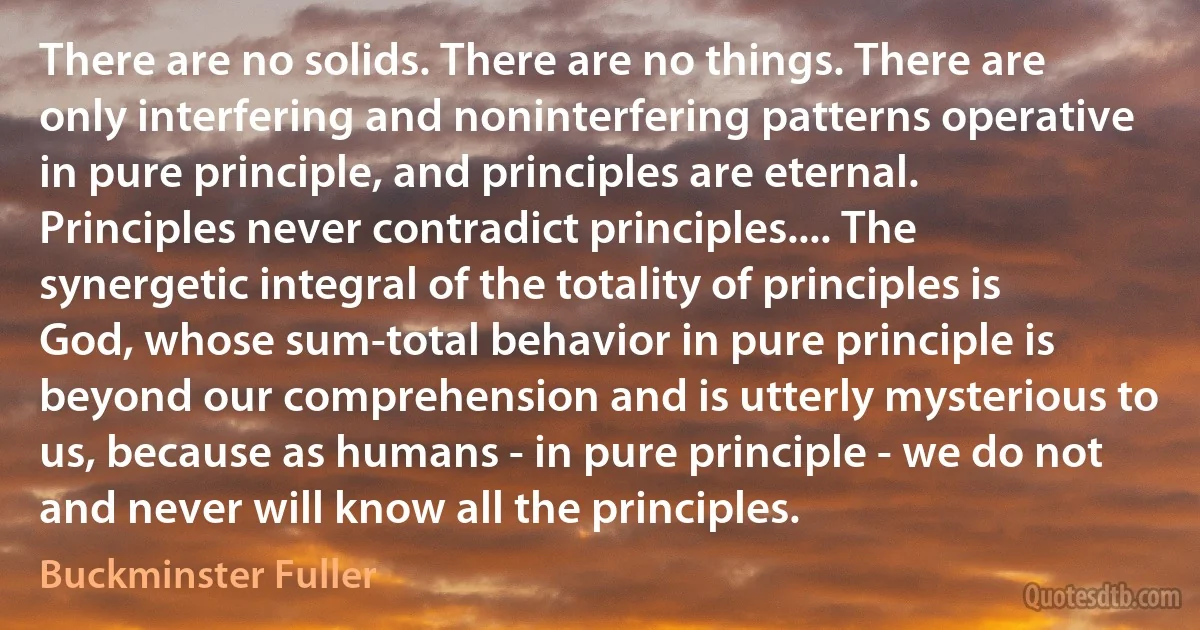Interfering Quotes - page 2
Darkness or not, she moves rapidly around, reaching, touching cobwebs, cheese, slating shelves, the pallet interfering with each step. If she trumbles, she is not aware of it because she does not know where her body stops, which part of her is an arm, a foot or a knee. She feels like an ice cake torn away from the solid surface of the stream, floating on darkness, thick and crashing against the edges of things around it. Breakable, meltable and cold.

Toni Morrison
The Soviet leaders accused Comrade Stalin of allegedly interfering in other parties, of imposing the views of the Bolshevik Party upon others. We can bear witness to the fact that at no time did comrade Stalin do such a thing towards us, towards the Albanian people and the Party of Labor of Albania, he always behaved as a great Marxist, as an outstanding internationalist, as a comrade, brother and sincere friend of the Albanian people. In 1945, when our people were threatened with starvation, comrade Stalin ordered the ships loaded with grain destined for the Soviet people, who also were in dire need of food at that time, and sent the grain at once to the Albanian people. Whereas, the present Soviet leaders permit themselves these ugly deeds.

Enver Hoxha
They could have gotten help for this infertility but they believed that interfering with the reproductive process, even if it was faulty, was anti-God. It was against His plan. It never occurred to them that God may have provided the world with a vast array of very brainy medical types for the very reason of solving problems such as theirs. However, there is one thing that the medical profession cannot do and that is save people from being idiots.

Craig Ferguson
The United States government must cease interfering in Venezuela's internal politics, especially for the purpose of overthrowing the country's government. Actions by the Trump administration and its allies in the hemisphere are almost certain to make the situation in Venezuela worse, leading to unnecessary human suffering, violence, and instability.

Noam Chomsky
Control of thought is more important for governments that are free and popular than for despotic and military states. The logic is straightforward: a despotic state can control its domestic enemies by force, but as the state loses this weapon, other devices are required to prevent the ignorant masses from interfering with public affairs, which are none of their business.

Noam Chomsky
In the middle of the work of art, an artist often feels that he is failing. And he starts interfering with his inspiration. That is a mistake. The mistake. It is best to push on through. Such works frequently turn out to be the best. To fail is a very ordinary experience for an artist. To fail and fail and still go on, marks his character. Most people cannot bear to fail, even once. They think of security.

Agnes Martin
The slave-owner is at times visited with a nightmare. He finds that his free will, in spite of its freedom, is thwarted, not by a superior will but by things-in-themselves – by inferior wills, accidents, mistakes, and his own ignorance. Yet he is still unable to conceive his will except as being thwarted like that of his slave's by another will, and since he the master is so thwarted, might not even the world's master and his – God Himself – be thwarted in his volition by some grand over-riding will, by Will-in-Itself? This is the slaveowning conception of Moira, or Fate, a comparatively late development reaching its noblest expression in Greek tragedy. This Fate, in spite of its closeness to bourgeois determinism, betrays its slave-owning parentage by the fact that it is always visualised as a consciously forseeing Will, and always as thwarting, not determining human wills as well as events, but interfering with human wills by means of events.

Christopher Caudwell
We propose to entirely exclude prayer and every form of ritual. Thus shall we avoid even the appearance of interfering with those to whom prayer and ritual, as a mode of expressing religious sentiment, are dear. And on the other hand we shall be just to those who have ceased to regard them as satisfactory and dispensed with them in their own persons.

Felix Adler
Still, a prince should make himself feared in such a way that if he does not gain love, he at any rate avoids hatred; for fear and the absence of hatred may well go together, and will be always attained by one who abstains from interfering with the property of his citizens and subjects or with their women. And when he is obliged to take the life of any one, to do so when there is a proper justification and manifest reason for it; but above all he must abstain from taking the property of others, for men forget more easily the death of their father than the loss of their patrimony. Then also pretexts for seizing property are never wanting, and one who begins to live by rapine will always find some reason for taking the goods of others, whereas causes for taking life are rarer and more quickly destroyed.

Niccolò Machiavelli
In the rush to become all things to all people, the federal government has lost sight of its core responsibilities. As a result we're stuck in this frustrating paradox where Washington actually neglects things it's clearly supposed to be doing, while interfering in other areas where they are neither welcome nor authorized.

Rick Perry



